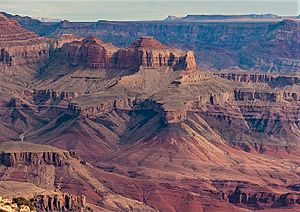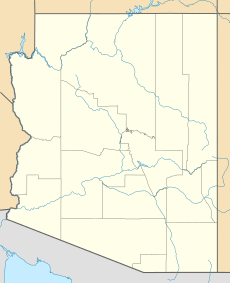Venus Temple facts for kids
Quick facts for kids Venus Temple |
|
|---|---|

Venus Temple-(left),
Apollo Temple-(right) |
|
| Highest point | |
| Elevation | 6,281 ft (1,914 m) |
| Prominence | 501 ft (153 m) |
| Isolation | 0.86 mi (1.38 km) |
| Parent peak | Jupiter Temple |
| Geography | |
| Location | Grand Canyon National Park Coconino County, Arizona, US |
| Parent range | Kaibab Plateau (Walhalla Plateau) Colorado Plateau |
| Topo map | USGS Cape Royal |
| Geology | |
| Age of rock | Pennsylvanian down to Neoproterozoic |
| Mountain type | sedimentary rock: sandstone, siltstone, mudstone, limestone, shale volcanic rock: basalt |
| Type of rock | Supai Group, Redwall Limestone, Muav Limestone, Bright Angel Shale, Tapeats Sandstone, Grand Canyon Supergroup-(4 units), 2–Nankoweap Formation, 1–Unkar Group-members-(5) 5_Cardenas Basalt, 4_Dox Formation |
Venus Temple is a tall mountain peak in the eastern part of the Grand Canyon. It stands 6,281 feet (about 1,914 meters) high. This amazing landform is located in Coconino County, in northern Arizona, USA. It is very close to another peak called Apollo Temple, which is just to its south-southeast.
Venus Temple is about 2 miles (3.2 km) northwest of the Colorado River, which flows southwest through the canyon. Both Venus Temple and Apollo Temple are about 4 miles (6.4 km) west of the Grand Canyon's East Rim. Water from the east side of Venus Temple flows into Upper Basalt Canyon. Water from the west side flows into Lower Unkar Creek.
What is Venus Temple Made Of?
The main part of Venus Temple is made from different layers of rock. The top layers are part of the orange-red Supai Group. Below this, you'll find the Redwall Limestone, which forms steep cliffs. Underneath these, there are older rocks from the Cambrian Tonto Group. Even deeper down, you can find rocks from the Grand Canyon Supergroup. These layers tell a long story about Earth's history!



